You know that feeling you get when someone (or everyone) in your house has been sick? After the stomach flu has visited our house my skin begins to crawl and I want to take a flamethrower to the bathroom.
The bathroom is the number one place to clean and sanitize to prevent the spread of icky germs.
I used to reach for bleach or Lysol until I read about the health risks associated with some disinfectant cleaners. I found my cleaners on the EWG’s Guide to Healthy Cleaning and what I saw shocked me.
My commercial cleaners were all given failing grades of D or F!
Was I Cleaning or Polluting My Home?
I did some more digging into commercial cleaners and what I found out made my skin crawl more than germs:
- Manufacturers of cleaning products in the United States do not have to test their products to make sure they are safe for people or the environment.
- Manufacturers do not have to list all ingredients on the label of cleaning products.
- Overuse of antibacterial chemicals are causing bacteria to become antibiotic resistance.
The Truth About Commercial Disinfecting Cleaners
Bleach, my go-to bathroom disinfectant, and other commercial cleaning products can contain hazardous chemicals and indoor air pollutants (VOCs) that can cause both immediate and long term health problems.
We’re talking asthma, hormone disruption, heart disease, cancer, headaches, eye irritation, congestion, and nausea.
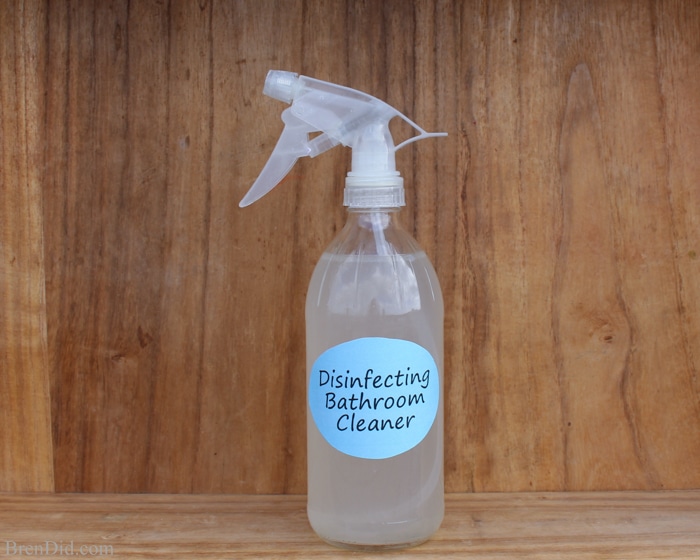
The Natural Solution
Making you own DIY natural disinfectant cleaner from inexpensive household ingredients can reduce your chemical exposure and get your bathroom sparkling clean. .
This easy disinfecting bathroom cleaner use three basic, inexpensive ingredients:
- Water
- Vodka
- Washing Soda
You can also add essential oils to boost cleaning power. I recommend tea tree oil for bathroom cleaning and also add eucalyptus, rosemary, and lavender.
The cleaner can be used for everything from scrubbing toilets and washing floors to removing soap scum from sinks and scouring counter tops.
Natural Cleaners Save Money
All-Natural Bathroom Disinfectant Cleaner costs less per use than many store-bought products, and does not contain harsh chemicals or artificial fragrance.
Saving money and eliminating dangerous chemicals? I call that a Win-Win!
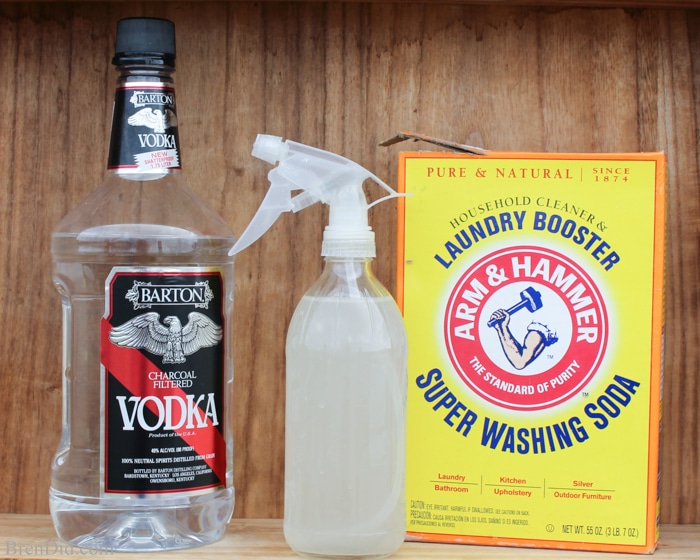
Ingredients
- 1 – 1 1/4 cup hot water
- ¼ cup washing soda/sodium carbonate (or baking soda/sodium bicarbonate)
- 1/2 cup vodka
- 10 drops tea tree oil
- 5 drops of eucalyptus essential oil (optional)
- 5 drops lavender essential oil (optional)
- 5 drops of rosemary essential oil (optional)
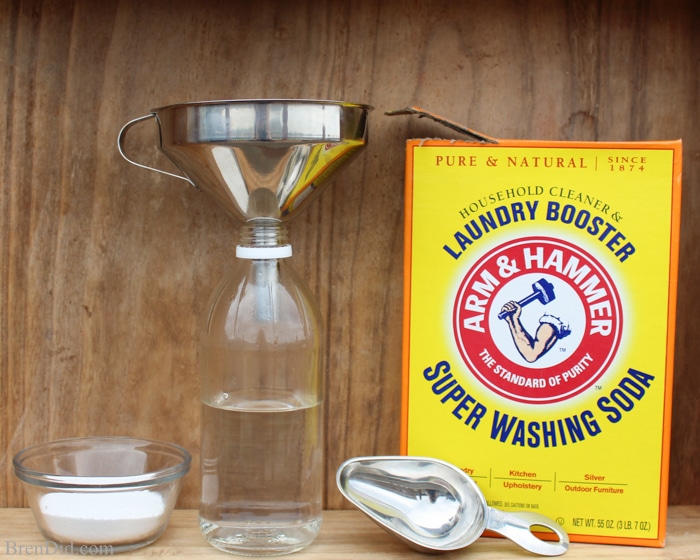
Directions
- Combine hot water and soda in a glass bottle. Shake well to dissolve.
- Pour vodka and essential oils into the bottle. Shake to combine.
- Download and attach this free printable PDF label to the bottle.
- To use: Wearing gloves, spray the area, and scrub until very clean. To disinfect you must mist again with cleanser and allow it to remain wet for a few minutes to kill all bacteria.
- Note: You must rinse well or the cleaner will leave white streaks from the soda. If you want a non-rinse cleaner you can leave out the soda or try Lemon Infused Disinfectant Spray Cleaner.
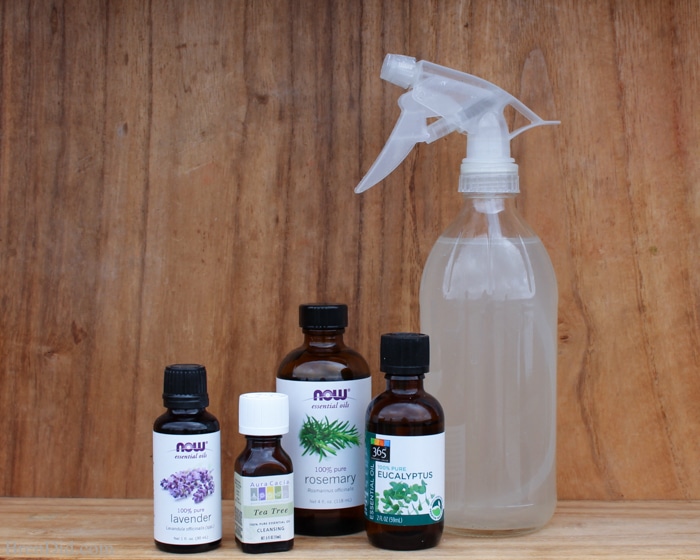
Why These Ingredients Work
- Sodium carbonate (washing soda) is a highly alkaline substance with a pH of almost 12 (on the pH scale that ranges from 0 to 14 ). This high alkalinity means that it is a powerful cleaning agent that can neutralize acidic fluids such as bile and urine in addition to effectively cleaning other substances such as oils, fats, greases and proteins.
- Ethanol is commonly used as an active ingredient in hand disinfectants. Healthcare workers are advised to use alcohol-based hand disinfectants for routine hand disinfection. The vodka sold in the United States has a minimum ethanol content of 40%.
- Tea tree essential oil has a deep herbal scent and is anti-viral, antibacterial and antifungal. learn more from the National Center for Biotechnology Information.
- Eucalyptus essential oil has a fresh slightly, medicinal smell and was used in traditional medicine as an antiseptic, it has strong deodorizing properties.
- Lavender essential oil has a relaxing floral scent with antibacterial and antiviral properties and has been used to treat fungal infections.
- Rosemary has a fresh scent that is reminiscent of pine and mint. It has antimicrobial and antiseptic qualities.
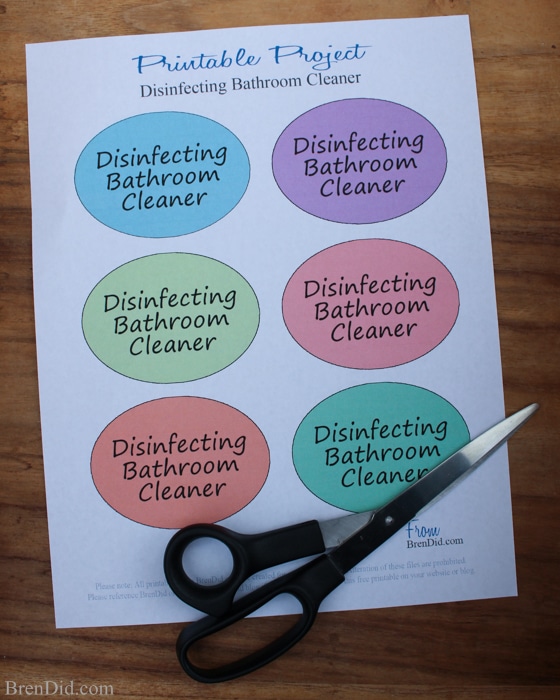
Green Cleaning Tips for Bathrooms
- Use this cleaner on hard, non-porous surfaces, such as floors, walls, bathtubs, tile and grout. (Check natural stone surfaces with your manufacturer.)
- Always clean bathroom surfaces and then disinfect. Cleaning vigorously with cleanser and a microfiber cloth can remove almost as many germs as chemical disinfectants.
- Allow disinfected area to remain visibly wet for 5 minutes of dwell time. This allows the cleaner to kill germs.
- Sodium carbonate is a skin irritant. Wear gloves when using this cleaning solution.
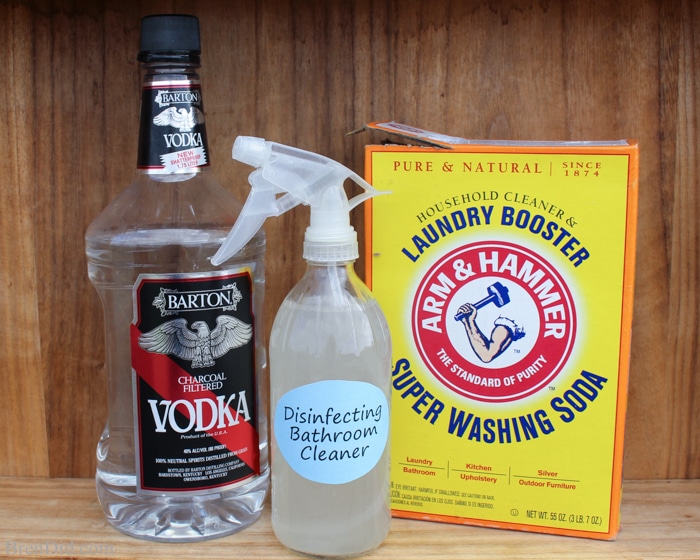
Try making this simple cleaner if you love to scrub your bathroom after an illness but are concerned about using dangerous chemicals. You can clean without dangerous chemicals (or a flamethrower).

Try making Lemon Infused Disinfectant Spray Cleaner for a non-rinse cleaner that stores well.
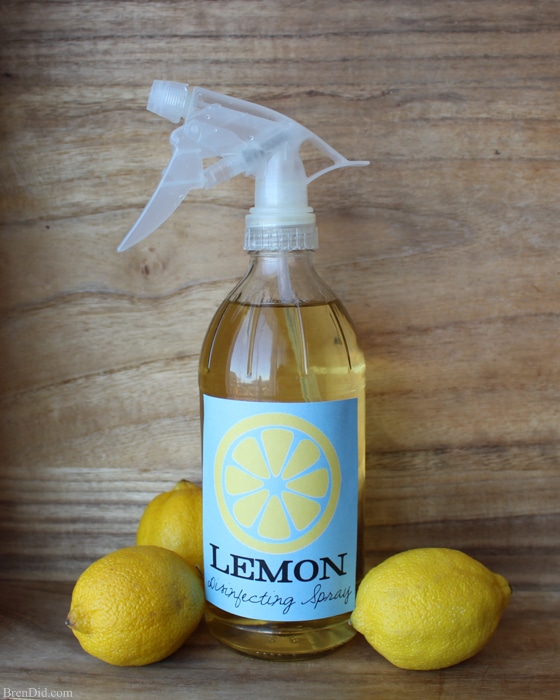



Zahara
Can I just make a concentrate with the ethyl, essential oil and washing soda and then add it to a spray bottle with water as needed?
Bren
I have not tried making a concentrate so I ma not sure how it would work.
Gadija
Hi Bren
Any alternative to vodka? Vodka isn’t applicable because Muslims don’t use alcoholic substances hence I’m a bit stuck here unfortunately
Bren
Gadija, I would use my no scrub shower cleaner instead (it also works great on toilets, showers, etc) or use plain hyrdrogen peroxide which is also naturally antimicrobial!
Heidi Z Howieson
Do you have the fall essentials oil labels available
to print? Thank you.
Bren
Hi Heidi! It’s available on the free printables page under “Natural Home Care Printables”. Let me know if you have trouble finding it!
Tracy
Bren,
I am allergic to wheat, corn which is the cheap vodkas. Can I use Rum? it is much cheaper and made with sugar cane.
Bren
I’ve never tried cleaning with rum so I’m not sure how it would work. You could try making a mini batch and see how it works out. Let me know if you try.
LS
I’ve recently started doing a lot of research on the EWG’S site and making my own cleaners. i love reading about all of your cleaners… thanks for the recipes! One thing I will caution is the use of tea tree oil. You should read what the EWG says about in this Article. To sum it up, tea tree is an excellent antimicrobial, but using it at low level sustained applications can actually create antibiotic resistant human pathogens. Yikes!!
Bren
Thanks for commenting. I agree with the EWG, using anything antimicrobial or antibacterial for a sustained period of time can result in less than desirable side effects. I stick to plain old homemade cleaners like castile soap, vinegar, water, etc most of the time. I haul out the tea tree for a bad illness (cleaning/disinfecting) or as a temporary treatment. No sense treating a problem that doesn’t exist. 🙂
Sara Wood
I made a batch of this cleaner and did everything exactly right and when I used it it left a gritty film on my counter tops and toilet from the washing soda. It was completely dissolved to start and I even shook it well before spraying but still a gritty film left behind, very unpleasant. I was really excited for a natural disinfecting cleaner but I can’t deal with film left behind ????
Bren
Sara, this cleaner is one you have to rinse well with water. It will leave a film if it is not rinsed completely. If you prefer a no-rinse natural disinfecting cleaner you should try Lemon Disinfecting Spray Cleaner.
Maria
Can you store this solution or do you have to make a fresh batch every time?
Bren
You can store it but will need to shake it to remix before using each time. This lemon version can be stored and does not need shaking.
Christine
Do you have any suggestions for a daily shower cleaner that would help keep soap scum, mold and mildew from developing between deep cleanings?
Bren
I would use a mixture of 1/2 cup vinegar, 2 cups of water, and 1 Tbsp detergent such as Sal’s Suds. You could also add tea tree oil.
Megan
Hi Bren! I made this and loved it! You really do have to rinse well so if it splatters on the floor and you miss it,it’s revealing ;). My problem is I only made this a week ago and I went to use it yesterday and there’s a lot of crystallization in there (which broke the sprayer). I also had this happen in the dishwasher detergent (dry detergent)that I made. It left little chunks in the dispenser and some white residue on some dishes. Have you experienced this problem or can offer any advice? Thanks so much.
Bren
So sorry Megan! I generally use mine up pretty quickly (I clean all my bathrooms at once.) You can add some hot water to re-dissolve the cleaning ingredients or try my new favorite toilet cleaner. As far as the dishwasher powder, it’s the citric acid that can make the powder mixture harden. It happens if there is a lot of humidity or moisture in the air. You can prevent the hardening three ways:
1) Save a silica gel pack from a pair of shoes and keep this in the jar with the detergent
2) Make a little mesh or muslin bag of uncooked rice and keep this in the jar with the detergent
3) Make the mixture in a large bowl then leave it out uncovered for a few days, stir it several times a day to remove clumps, store in an airtight jar once it stops clumping.
Hope this helps!
-Bren
Mary Beth
Could you use Isopropyl Alcohol instead of the vodka? Would it provide the same disinfectant properties?
Bren
Mary Beth, you could use rubbing alcohol (isopropyl alcohol) however I do not use rubbing alcohol in my home as it contains synthetic fragrance ingredients which can be made with cancer causing chemicals. You can read more about rubbing alcohol’s ratings here.
Yohonna
Hi Bren, thanks for the recipe! You don’t mention toilets. Do you use this for toilets too or do you have another recipe? I’m having a hard time finding a good, non-toxic cleaner for that.
Bren
I use it in toliets if I have it handy. I also like to use good old vinegar!
amie a
Question: I am wondering if the Vodka would eat away at certain surfaces?
Tyvm
Amie
Bren
Vodka is mildly acidic so it could be possible. I have never had problems using it in my cleaning recipes. You should test a surface if you have concerns.
Ty
Hi, great recipe for a disinfectant!
However, I am curious to know if this solution has any sort of shelf life, or if its a one time use. Thanks!
Bren
Thanks Ty! I have successfully store it in a glass spray bottle for a few weeks. I clean a lot of bathrooms so it was used up. If you’re only cleaning one bathroom you might want to mix half a batch.
Christi
Hi! Thanks for your post! I use a very similar recipe but will definitely be trying yours out! I’m curious about your glass spray bottles… Do your sprayers last a long time? And where did you get yours from? Thanks again!
Bren
Thanks Christi! I have been using glass sprayers for about a year and they are still going strong… I think they will last a LONG time. I wrote this simple tutorial so you can see how I make my own upcycled glass spray bottles.
Tammy
1-11/4 or 1-1/4 cups hot water for the vodka bathroom cleaner. If its 1-11/4 cuos. How in the world do u get 11/4. Thnx
Bren
1.25 cups! Otherwise you’d have a lot of very weak cleaner!